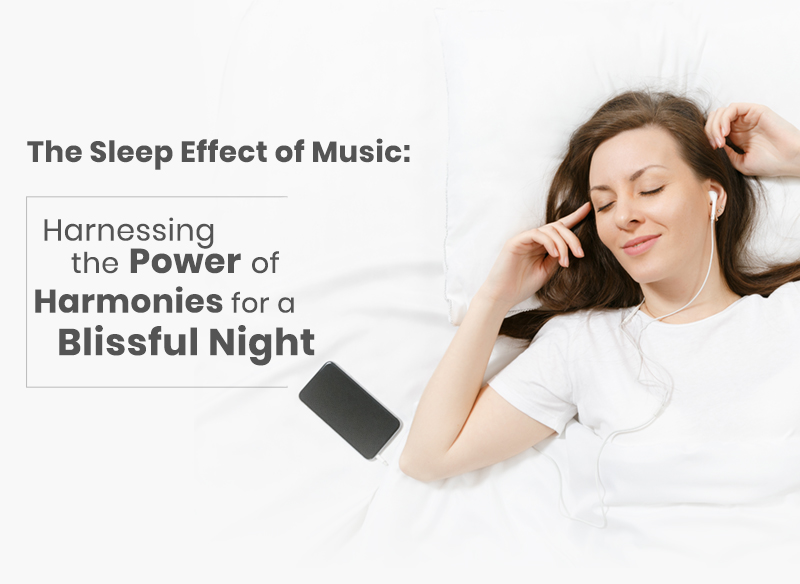In this hubbub of daily grinds, getting a beauty sleep has become arduous. Sleep deprivation has become a common issue that affects the well-being of our minds and bodies. According to recent research, it says music has become the remedy to get some shut-eye. Here we will take a closer look at how music can affect our sleep and overall health.
Music and sleep – the science behind it!
For decades, scientists have been fascinated by how music affects sleep. Many studies have revealed the many ways in which music affects our sleep:
Stress Relief: Music has a remarkable ability to alleviate stress, acting as a powerful antidote to the pressures of daily life. By listening to calming melodies and soothing rhythms, we can effectively reduce our cortisol levels and find ourselves in a more relaxed state before drifting off to sleep.
Relaxation Induction: Certain genres of music, such as classical, ambient, or natural sounds, possess a unique talent for inducing relaxation. The gentle tempo and tranquil elements of these musical styles help slow down our heart rate and release tension from our bodies, making it easier to transition into a peaceful slumber.
Noise Masking: Music, particularly white noise or nature sounds, can act as a shield against external disturbances. By masking disruptive noises, music creates a serene environment that promotes uninterrupted sleep, allowing us to wake up feeling refreshed and rejuvenated.
Quality Enhancement: Incorporating music into different stages of sleep can significantly enhance its overall quality. Whether we use music to help us fall asleep faster or play it during REM sleep, studies have shown that music has the potential to improve the overall restfulness of our sleep.
Selecting the Perfect Music for a Good Night’s Rest
Getting a restful night’s sleep can often seem elusive, but the right music can make all the difference. It’s important to keep the following factors in mind when deciding on what music to listen to before bed:
Tempo and Rhythm: Slow-paced music with a regular rhythm and even volume is ideal. Abrupt changes or loud beats can be disruptive and hinder relaxation.
Instrumentation: Instrumental pieces that lack lyrics, such as classical compositions or ambient sounds, have a calming effect that can promote sleep.
Personal Preference: Everyone responds to music differently, so it’s essential to experiment with different genres and styles to find what works best for you.
Practical Ways to Incorporate Music into Your Sleep Routine
Using music as a sleep aid is easy to incorporate into your routine. Here are some useful tips:
Bedtime Routine: Listening to calming music as part of a consistent bedtime routine signals to your brain it’s time to unwind and prepare for rest.
Music Duration: Play music for a duration that allows you to drift off to sleep naturally, about 30 minutes of relaxed and soothing melodies.
Technology Options: Modern technology offers many apps and devices with specially designed playlists for sleep, including sounds of nature, white noise, or relaxing music.
Relaxation Techniques: Combine relaxation techniques like deep breathing or meditation with music to enhance its calming and sleep-inducing effects.
The Perks of Music-Enhanced Slumber
In addition to its immediate calming effects and ability to lull us into dreamland, music-assisted sleep brings forth a plethora of other advantages. To begin with, incorporating music into our sleep routine can elongate the duration of our slumber. When the music is played quietly throughout the night, it creates a peaceful and undisturbed sound that reduces the chances of any interruptions or wakeings.
Music can also help us get a good night’s sleep by bringing on the deep, restorative stages of sleep and keeping our body clock in sync. Our brains get used to hearing certain songs or rhythms associated with sleep, and these cues can trigger the release of hormones that make us sleepy.
Precautions and considerations regarding the effects of music on sleep
Please keep in mind the following modifiers while addressing the impact of music on sleep.
Volume: The power of music is undeniable, but when it comes to sleep, it’s crucial to pay attention to the volume. Blasting music at high volumes can disrupt your slumber and interfere with your body’s natural sleep process. To ensure a peaceful and undisturbed night’s rest, try keeping the volume levels low and soothing.
Timing: Timing is everything, especially when it comes to incorporating music into your sleep routine. While music can work wonders, listening to it too late into the night might hinder your ability to fall asleep or disrupt the continuity of your sleep. To fully reap the relaxation benefits, it’s advisable to start indulging in soothing melodies well before bedtime. This allows your mind and body to unwind, paving the way for a tranquil slumber.
Sleep disorders: While music has the potential to enhance the quality of sleep for many individuals, it might not be as beneficial for those with certain sleep disorders like insomnia or sleep apnea. In such cases, it becomes crucial to seek professional medical guidance for appropriate management and treatment.
Music plays a vital role in regulating our physiological processes and reducing stress levels. By using the amazing healing powers of music, you can enjoy a restful sleep like never before. Restonic, the unparalleled sleep solution in the UAE, has consistently proven its superiority by delivering the utmost quality bedding products for nearly a century. Garnering the prestigious Consumers Digest Best Buy Award for both its exceptional quality and unbeatable value, Restonic stands tall as the unrivaled champion in the realm of sleep products.













